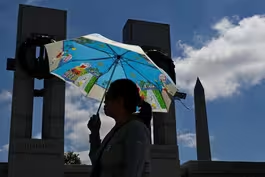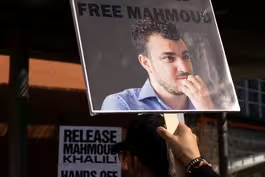
How to stay safe from the dangers of extreme heat
Clip: 6/20/2025 | 6m 4sVideo has Closed Captions
How to stay safe from the dangers of extreme heat
For more on the dangers of extreme temperatures and key tips for dealing with the heat, Stephanie Sy speaks with Ashley Ward, director of the Heat Policy Innovation Hub at Duke University.
Problems playing video? | Closed Captioning Feedback
Problems playing video? | Closed Captioning Feedback
Major corporate funding for the PBS News Hour is provided by BDO, BNSF, Consumer Cellular, American Cruise Lines, and Raymond James. Funding for the PBS NewsHour Weekend is provided by...

How to stay safe from the dangers of extreme heat
Clip: 6/20/2025 | 6m 4sVideo has Closed Captions
For more on the dangers of extreme temperatures and key tips for dealing with the heat, Stephanie Sy speaks with Ashley Ward, director of the Heat Policy Innovation Hub at Duke University.
Problems playing video? | Closed Captioning Feedback
How to Watch PBS News Hour
PBS News Hour is available to stream on pbs.org and the free PBS App, available on iPhone, Apple TV, Android TV, Android smartphones, Amazon Fire TV, Amazon Fire Tablet, Roku, Samsung Smart TV, and Vizio.
Providing Support for PBS.org
Learn Moreabout PBS online sponsorshipNow let's focus on the dangers of extreme heat, which is considered the leading weather-related cause of death in the United States.
Local officials are warning people to take precautions, including in Chicago, where the heat is expected to get serious tomorrow.
Mayor Brandon Johnson warned about the health risks and recalled a deadly heat wave the city experienced in 1995.
BRANDON JOHNSON (D-Mayor of Chicago, Illinois): Chicago knows better than any other city in America the danger of extreme weather, particularly extreme heat.
In fact, we are one month away from the 30-year anniversary of the 1995 heat wave, the deadliest heat wave in American history.
We lost more than 700 Chicagoans.
Most of them were the elderly and the poor.
It really challenged the city to recognize the danger of extreme heat so that we never see a tragedy like that occur again.
STEPHANIE SY: For more on those dangers and key tips for dealing with the heat, we turn to Ashley Ward, director of the heat policy innovation hub at Duke University.
Ashley, thank you so much for joining us.
So we just heard from the mayor of Chicago reminding us that the elderly and the poor were particularly vulnerable in that heat wave of '95.
Talk to us about what factors go into certain groups being at greater risk and what can be learned from previous deadly heat waves.
ASHLEY WARD, Heat Policy Innovation Hub Director, Duke University: Sure.
I mean, certainly, our age populations, children, the poor, as the mayor pointed out, but also pregnant women.
In many of these cases, what's happening is the body's ability to thermoregulate is not as efficient as it once was when someone was younger, if you're a child, not quite as efficient as it will be.
And so, as you get exposed to heat, your body is having to work harder to keep your core body temperature at safe levels.
But also many of the people in these vulnerable groups suffer from other underlying chronic conditions like cardiovascular disease or respiratory renal diseases, which also make it harder for your body to thermoregulate.
And then, finally, they take prescription drugs, which many of them actually impede the body's ability to cool itself down.
And these are very common medications, say like for hypertension, high blood pressure, anti-anxiety, anti-depression medications, anti-psychotics.
These are common medications that people take, and they may not understand that last year they were able to go out and go for a walk at 3:00 in the afternoon.
But, this year, because of that medication, it might be a little more dangerous for them to do so.
STEPHANIE SY: One thing that the meteorologist I just interviewed talked about, Ashley, was the fact that, with some of these heat waves, we're seeing very high overnight lows.
I mean, sometimes those lows are in the 90s.
Can you talk about how that potentially increases risk for populations?
ASHLEY WARD: Sure.
Everything needs a reprieve overnight, our bodies, our plants, our animals, our energy systems, our infrastructure.
And when we have situations in which we have high daytime temperatures, followed by persistently high overnight temperatures -- and typically that threshold is about 75 degrees.
So when temperatures remain high, above 75 degrees, overnight, we see actually a higher number of poor health outcomes, people visiting the emergency departments and mortality associated with that.
So you can imagine an 80- or 90-degree overnight temperature.
We see these relationships with increases in preterm birth, but we also see it in all kinds of other health outcomes.
A lot of this has to do with that reprieve that I was talking about is hard to achieve, especially if you don't have air conditioning or can afford to run your air conditioner.
So it used to be that you could raise your windows overnight and it would be cooler at nighttime and you could get those breezes and cool down your house.
But if temperatures overnight remain persistently high, it's harder to do so, putting you at greater risk.
STEPHANIE SY: Heat deaths, I have often been told in my reporting, Ashley, are preventable.
What are the important things for people to know to keep in mind as we go into these next couple of days?
Should they just stay inside?
And what do they do if they don't have air conditioning?
ASHLEY WARD: That's a really great question.
There's a combination of things.
Of course, once it gets beyond a certain temperature, really, air condition is what's required.
And so I would recommend that, if you don't have air conditioning at all, that you make a plan.
Find where cooling centers are in your community.
Think about whether there's a shopping center or mall that you can go visit in the early evening to cool down, or friends and family members that you can go and visit.
If you have access to air conditioning, but maybe you can't afford to run it enough to really cool your house, consider prioritizing air conditioning in your bedroom.
It could be more affordable to cool, and you can escape to that room.
The other, last thing I would say is remember that, while it's always very important to stay hydrated by drinking plenty of fluids, when it comes to lowering your core body temperature, water is very effectively used outside your body.
So think about things like taking a cool shower when you come home from work, rather than just sitting on the couch and drinking a drink.
Use water to immerse your feet over your ankles or your arms over your elbows.
We know that these are techniques at work that lower core body temperature.
Think about taking a cold wet rag and either putting it behind your neck or wiping down your arms and legs, sitting in front of a fan while you do so.
So, if you think about ways that you can use cool water outside of your body, in addition to staying hydrated, those are also some ways that you can keep yourself safe during periods of high heat.
STEPHANIE SY: That is Ashley Ward, director of the Heat Policy Innovation Hub at Duke University.
Thank you so much for those tips, Ashley.
ASHLEY WARD: Thank you.
And stay safe.
Brutal heatwave blankets much of the U.S.
Video has Closed Captions
Clip: 6/20/2025 | 4m 25s | Brutal heatwave blankets much of the U.S. (4m 25s)
Capehart and Ponnuru on Trump's stance on Iran
Video has Closed Captions
Clip: 6/20/2025 | 11m 17s | Capehart and Ponnuru on Trump's stance on Iran and the rise in political violence (11m 17s)
Carla Hayden on her time as pioneering librarian of Congress
Video has Closed Captions
Clip: 6/20/2025 | 7m 2s | Carla Hayden on her time as a pioneering librarian of Congress and getting fired by Trump (7m 2s)
European leaders meet with Iran's foreign minister
Video has Closed Captions
Clip: 6/20/2025 | 4m 24s | European leaders meet with Iran's foreign minister as war with Israel rages on (4m 24s)
Federal agents are denied access to Dodger Stadium
Video has Closed Captions
Clip: 6/20/2025 | 6m 25s | Federal agents are denied access to Dodger Stadium in latest immigration clash (6m 25s)
How people inside Iran are reacting to the war
Video has Closed Captions
Clip: 6/20/2025 | 5m 27s | How people inside Iran are reacting to the war (5m 27s)
News Wrap: Judge orders release of Mahmoud Khalil
Video has Closed Captions
Clip: 6/20/2025 | 6m 23s | News Wrap: Judge orders release of Mahmoud Khalil from immigration detention (6m 23s)
Providing Support for PBS.org
Learn Moreabout PBS online sponsorship
- News and Public Affairs

FRONTLINE is investigative journalism that questions, explains and changes our world.

- News and Public Affairs

Amanpour and Company features conversations with leaders and decision makers.












Support for PBS provided by:
Major corporate funding for the PBS News Hour is provided by BDO, BNSF, Consumer Cellular, American Cruise Lines, and Raymond James. Funding for the PBS NewsHour Weekend is provided by...






